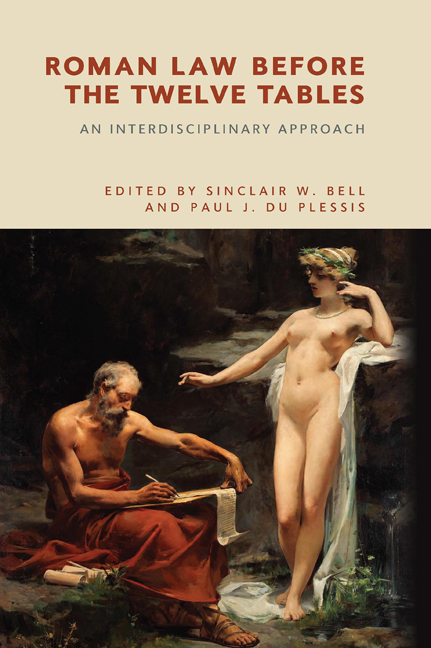Book contents
- Frontmatter
- Contents
- The Contributors
- Introduction: The Dawn of Roman Law
- Part I The Materiality of Roman Law: New Archaeological Discoveries
- 1 Roman Law in its Italic Context
- 2 Central Italian Elite Groups as Aristocratic Houses in the Ninth to Sixth Centuries BCE
- 3 Authority and Display in Sixth-Century Etruria: The Vicchio Stele
- Part II Constructing Early Roman Law: Sources and Methods
- 4 The Twelve Tables and the leges regiae: A Problem of Validity
- 5 The leges regiae in Livy: Narratological and Stylistic Strategies
- 6 The leges regiae through Tradition, Historicity and Invention: A Comparison of Historico-literary and Jurisprudential Sources
- 7 The Laws of the Kings – A View from a Distance
- 8 Beyond the Pomerium: Expansion and Legislative Authority in Archaic Rome
- Part III Roman Law in Historiography and Theory
- 9 Niebuhr and Bachofen: New Forms of Evidence on Roman History
- 10 Finding Melanesia in Ancient Rome: Mauss’ Anthropology of nexum
- Index
9 - Niebuhr and Bachofen: New Forms of Evidence on Roman History
Published online by Cambridge University Press: 22 September 2020
- Frontmatter
- Contents
- The Contributors
- Introduction: The Dawn of Roman Law
- Part I The Materiality of Roman Law: New Archaeological Discoveries
- 1 Roman Law in its Italic Context
- 2 Central Italian Elite Groups as Aristocratic Houses in the Ninth to Sixth Centuries BCE
- 3 Authority and Display in Sixth-Century Etruria: The Vicchio Stele
- Part II Constructing Early Roman Law: Sources and Methods
- 4 The Twelve Tables and the leges regiae: A Problem of Validity
- 5 The leges regiae in Livy: Narratological and Stylistic Strategies
- 6 The leges regiae through Tradition, Historicity and Invention: A Comparison of Historico-literary and Jurisprudential Sources
- 7 The Laws of the Kings – A View from a Distance
- 8 Beyond the Pomerium: Expansion and Legislative Authority in Archaic Rome
- Part III Roman Law in Historiography and Theory
- 9 Niebuhr and Bachofen: New Forms of Evidence on Roman History
- 10 Finding Melanesia in Ancient Rome: Mauss’ Anthropology of nexum
- Index
Summary
When Barthold Georg Niebuhr was appointed ambassador by the King of Prussia to the papal court in Rome in 1816, in charge of negotiating a new Concordat with the Holy See, he was already a prominent figure, both politically and culturally. Not only had he served in the upper reaches of the Prussian administration, but he was also a member of the Prussian Academy of Sciences and was at the centre of intellectual life in Berlin, now the German cultural capital. Here he had formed a dense network of relationships, which included, among other luminaries, Savigny and Schlachermeyer, who in those years had played an important role in the establishment of the Prussian capital's new university. Indeed, starting in 1810, Niebuhr had given a series of lectures on Roman history at the University of Berlin, and these formed the basis for the first two volumes of his History of Rome, published between 1811 and 1812. The importance of his relationship with Savigny, and with the world of German philologists more generally, became especially evident when he travelled to Rome in 1816 to assume his new post. This proved to be a fortunate journey, because during a stop in Verona, Niebuhr discovered a manuscript of Gaius’ Institutiones in his visit to the cathedral library. Despite not having the time to realise fully its significance, he immediately informed Savigny of his discovery. It was an epochal event in the history of Roman law, a field in which Savigny was recognised as indisputably the highest European authority.
In contrast to this auspicious start, Niebuhr's time in Rome turned out to be far from pleasant: to the objective difficulty of his mission must be added the bad weather and the terrible conditions in which he found the city, made all the worse by the papal government's poor administration. Niebuhr's letters from Rome dwelled repeatedly on these aspects, allowing us to grasp, albeit indirectly, how utterly alien he found papal Rome's ‘spiritual environment’ – to use perhaps too charitable a term for the city's degradation – but also how little he shared those visions of Rome's greatness that the city still evoked for the elite travellers who almost always made it the final stop on their Grand Tour.
- Type
- Chapter
- Information
- Roman Law before the Twelve TablesAn Interdisciplinary Approach, pp. 155 - 170Publisher: Edinburgh University PressPrint publication year: 2020



